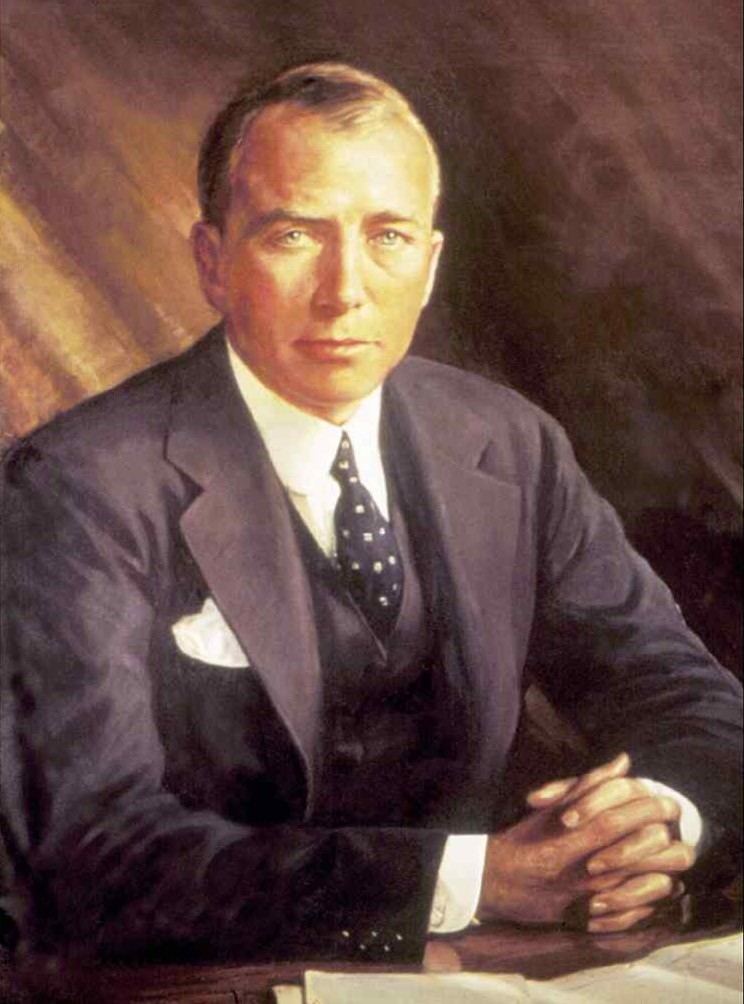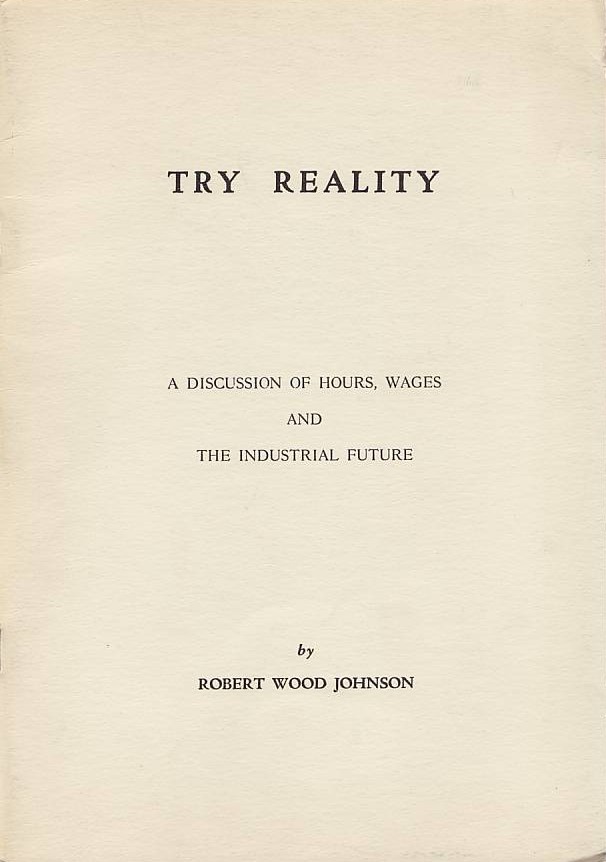Try Reality

Robert Wood Johnson
A recent post talked about Robert Wood Johnson and Johnson & Johnson being at the forefront of the debate about the need for higher wages and reduced hours to increase consumer spending and get the unemployed back to work during the Great Depression. (In case you haven’t read that post, Robert Wood Johnson advocated for higher wages and shorter hours than the New Deal proposals were suggesting.) Johnson implemented his ideas at Johnson & Johnson and, when his ideas worked, he tried in vain to interest the Roosevelt administration and other industrialists. His frustration at the lack of response caused him to sit down late one night at his home in Princeton, New Jersey and put his thoughts on paper. (He preferred using lined yellow pads of paper, in case anyone’s interested.) But instead of just filing away what he wrote, he published it in 1935 as a nine-page pamphlet called Try Reality: A Discussion of Hours, Wages and The Industrial Future.

Try Reality was written from Johnson’s heart and his personal beliefs. He sent a copy to every major industrialist in the nation, hoping for a meaningful response, and was met with…silence. Meanwhile, Try Reality was getting widespread praise in the press because of Johnson’s progressive -- and unusual for the time -- ideas about corporate social responsibility.
In 1935 American industry was struggling for survival. Although the New Deal legislation was moving forward, the Great Depression was still in full force. Many businesses were folding, increasing the already catastrophic unemployment. Other companies were pulling back, closing operations, shedding workers and concentrating on doing only what they felt was necessary to survive. In Europe and in the U.S., the economic dislocation gave rise to demagogues like Father Charles Coughlin and Huey Long who played on people’s fear and emotions and proposed radical solutions to the problems of the Depression.
It was in this atmosphere that Robert Wood Johnson spoke out about his belief that business had certain responsibilities toward society that went above and beyond just making a profit.
…“Private industry must solve this problem of poverty amid plenty if it wishes to remain private industry. The people simply will not stand for a continuation of present conditions. They demand and deserve a solution.” [Try Reality: A Discussion of Hours, Wages and The Industrial Future, by Robert Wood Johnson, 1935.]
The italics in the paragraph above were Robert Wood Johnson’s. He felt that this point was of supreme importance, and italicized it to make it stand out. Most of Try Reality was about wages and hours, and set out Johnson’s familiar argument that the New Deal proposals for a minimum wage and a 40-hour work week (which most other industrialists were fighting tooth and nail) didn’t go far enough if they wanted to reduce unemployment and spur spending. In the first section, called “Facing the Facts,” he wrote:
“The hours of employment and the problem of unemployment are two faces of the same medal. They cannot be considered separately. To do so ignores reality.”
At the end of the pamphlet was a section that Johnson titled “An Industrial Philosophy.”
“Out of the suffering of the past few years has been born a public knowledge and conviction that industry only has the right to succeed where it performs a real economic service and is a true social asset.
“Such permanent success is possible only through the application of an industrial philosophy of enlightened self-interest. It is to the enlightened self-interest of modern industry to realize that its service to its customers comes first, its service to its employees and management second, and its service to its stockholders last. It is to the enlightened self-interest of industry to accept and fulfill its full share of social responsibility.”
[Try Reality: A Discussion of Hours, Wages and The Industrial Future, by Robert Wood Johnson, 1935.]
This was the initial seed of what would become Our Credo. Johnson would think about and expand on these ideas over and over again – adding responsibility to the community, among other things – in the coming years before they found final expression in Our Credo in 1943. Robert Wood Johnson would probably have found it interesting that, in light of recent events, many business schools are now looking for ways to increase their emphasis on the kinds of social responsibilities that he advocated and put into practice at Johnson & Johnson.

Thanks for reminding us on those prinicple of sustainability. It clearly indicates that RW Johnson was a visonary leader far ahead of his peers on sustainable business development. Those principles are still very applicable today, especially in the current economical environment; it is so shocking to see that so many industry leaders are just focussing on short term profits setting aside all ethical behaviors.
Wanted to let you know how much I enjoy your blog. It has absolutely nothing to do with my chosen blog topis, but I really find it interesting. Well done!
Is there any way to see a copy of the document?
There is a sense of security when we learn what our leadership have done in the past, which has become the foundation of what we have and are today. Men and women who care, embrace divercity and are of sound character, leadsership and vision, inspire engagement and hope in others. This is what we see in the present and what we must continue to be, in order to build on what we enjoy today.
TRY ROBERT WOOD JOHNSON.
He's simply amazing.
Patricia,
He was amazingly foresighted with regard to corporate social responsibility and corporate citizenship. And he left Johnson & Johnson with that legacy (which we still keep today) through the writing of Our Credo, which will be the subject of my next post.
Margaret
It would be great if you had a link to the original Robert Wood Johnson writings like and including Try Reality
Thank You
In reply to by bud
Bud,
Thanks for your interest! Robert Wood Johnson's books and articles are not currently in print, so we cannot link to them.
Margaret
Thank you Margaret for writing and sharing this story. It is great to know and understand RWJ through his public writing and forsighted courageous actions at a very difficulty time in American history.